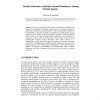Free Online Productivity Tools
i2Speak
i2Symbol
i2OCR
iTex2Img
iWeb2Print
iWeb2Shot
i2Type
iPdf2Split
iPdf2Merge
i2Bopomofo
i2Arabic
i2Style
i2Image
i2PDF
iLatex2Rtf
Sci2ools
MABS
2000
Springer
2000
Springer
Sexual Attraction and Inter-sexual Dominance among Virtual Agents
In many group-living primates, males are dominant over females, but despite this dominance, they allow females access to resources during the period when females are sexually attractive - but only then and not otherwise. Conventionally, such male `courtesy' is explained as a special strategy to gain mating access to females. In the present paper I propose a simpler hypothesis that is based on an agent-centered model, namely that male `courtesy' to females is in fact a kind of `timidity' that arises because sexual attraction automatically increases female dominance. The model consists in a homogeneous, virtual world with agents that group and perform dominance interactions. VirtualMales have a higher intensity of aggression and start with a greater capacity to win conflicts than VirtualFemales. I shall explain how the addition of attraction of VirtualMales by VirtualFemales leads to female dominance, and other phenomena that are relevant to the study of animal behaviour.
Female Dominance | Females Access | Intelligent Agents | MABS 2000 | Perform Dominance Interactions |
| Added | 25 Aug 2010 |
| Updated | 25 Aug 2010 |
| Type | Conference |
| Year | 2000 |
| Where | MABS |
| Authors | Charlotte K. Hemelrijk |
Comments (0)

